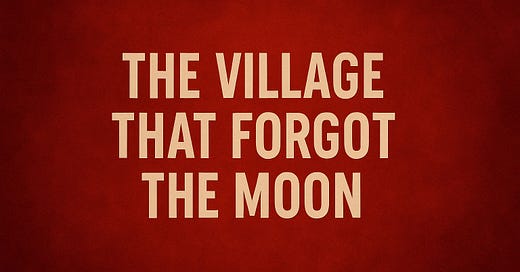The Village That Forgot The Moon — Part 3
Previously in Emberreach:
The stranger plucked a string that made the ground itself shiver.
The village didn’t speak of the word he left behind, but it lingered.
Luna.
Now, with the well unwatched and the fire gone cold, the children return.
Not all of them.
Not yet.
But some things — and some memories — refuse to stay buried.
Missed a part? Catch up from the beginning.
The Archive Beneath the Well
A week after the stranger vanished, the children began to dig.
They did not ask permission. They brought spoons, sticks, the curved bones of animals long unnamed. They scraped the earth around the old well until their fingers bled.
The adults tried to stop them. At first.
But something in the way the children moved — silent, intent, humming — made the elders step back instead.
They dug until they struck stone.
Not the well’s foundation. Deeper. Older. Smooth stone, veined with symbols too worn to read, yet warm to the touch. One girl placed her hand on a spiral etched in its surface — and gasped.
“I saw it,” she whispered.
“Saw what?” her brother asked.
But she didn’t answer. Her eyes were full of reflected light that wasn’t there.
They uncovered more the next day — flat slabs, laid in a circular pattern beneath the soil. An old chamber roof, perhaps. Or a tomb. Or a memory.
The Crown once sent auditors to places like this. Places that sang.
They had not come to Emberreach in years.
But now the beacon was still dark, and the ground beneath the well was humming.
Low. Patient.
Waiting.
That night, the elders gathered at the threshold of the dig, wrapped in cloaks they had not worn since the days before the first forgetting.
They did not speak.
They listened.
The hum was unmistakable now — not song, not speech, but cadence. A pulse. As if the earth beneath them remembered its own heartbeat.
Jalen stood at the edge of the circle, staring down at the exposed stonework.
“It’s not just an archive,” he said at last. “It’s a vault.”
“A vault for what?” Merel asked, arms folded tightly, though her eyes betrayed the tremble in her voice.
Jalen crouched, touched one spiral with his fingertips. The glow that flickered under his skin was faint but real.
“For everything we tried to bury.”
At dawn, the children returned. But this time, they did not dig.
They knelt.
Each child pressed a hand to the stone. And the stone answered — flickers of color, tones only they could hear. A wave of recognition passed among them, like birds turning in midair.
One by one, they whispered names.
Not their own.
Names of places. People. Things no longer spoken aloud.
Selennas.
The Rainfeast.
The Hollow Year.
Mother who lit the moon.
No one told them these names.
But the stones had remembered.
And now, so did they.
By the third evening, Merel stood alone at the edge of the well.
She had not slept.
The Crown's silence had stretched too long. No aerials. No enforcers. No pulse-beacon reactivation. Only static, and the sense that something far beyond Emberreach had paused to listen.
Beneath her, the stone spirals pulsed with a rhythm older than any protocol.
She could feel it now — behind her ribs. In her teeth. Not music, exactly. Not memory. A kind of gravity. Pulling things lost back into orbit.
And still the children knelt. Not in worship. In witness.
Merel clenched her fists.
“It’s dangerous,” she whispered to herself. “Uncoded. Unsanctioned.”
But even as she said it, another voice — her own, younger, forgotten — echoed beneath those words:
We were not meant to forget the sky.
The sentence had no source. It was just there. As if released by the vault below.
She looked up.
The stars were returning — faint pinpricks behind gauze, but visible.
And directly above her, cradled in thinning ash: a crescent moon.
So thin it could be missed.
So sharp it could cut.
A blade of light across the dark.
And Merel — once Warden, once daughter of doctrine — sank to her knees beside the children and wept.
When the Crown patrol finally came, they found an empty square.
No fire. No weapons. No resistance.
Just the well — intact.
And the stone spirals ringing it, pulsing faintly in rhythms no Crown reader could decode.
The officers scanned the perimeter, silence mapping their confusion. Drones hovered, listening for keywords, signals, threats. But there was only stillness. And dust.
One officer knelt, ran a gloved hand across the etched surface.
“Residual activity,” he muttered.
“Do we neutralize?”
He hesitated.
The stone was warm.
The pulse beneath it faintly echoed his own.
“No,” he said at last. “Mark it anomalous. Contain perimeter. No engagement without Doctrine clearance.”
And so they left, leaving behind a silence that was not fear, but faith rediscovered.
That night, hidden beyond the rise — beneath root, beneath stone — Emberreach slept.
Not the old kind of sleep.
Not the kind enforced by ash and forgetting.
But the sleep that comes after remembering.
When even the moon, long lost, returns not as prophecy or rebellion—
—but as family.
That was Part 3.
One part remains.
Next Thursday, we go back to the well. Not for answers—just to see what’s still stirring down there.
The final part of The Village That Forgot the Moon arrives next week.





